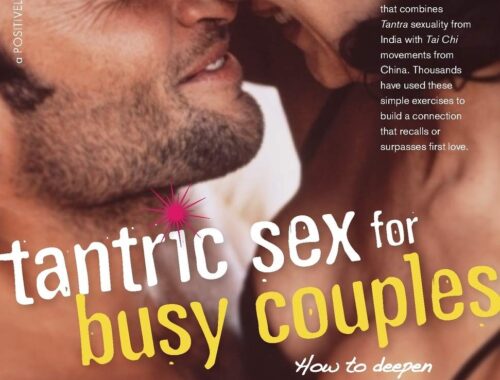Shawn Roop Talks Tantra and Sex

Tantra coach Shawn Roop’s talk “You Think You Know Sex?” offered juicy insight about spiritual tantric practices.
“Dang, that looks so good,” I thought. “Imma eat one right now.”
I put an extra peach on the scale at the farmer’s market, bagged the rest and surrendered to instant gratification under the tent. After caressing its soft flesh and sniffing its heady aroma, I touched it with my mouth like so many soft kisses, its juices running wildly down my arm, staining my dress–oh hell, I didn’t care. My first peach of my first summer in my new life in a new city: I made love to you, oblivious to the folks around me in a crowded street market, experiencing the now with fullness of being. I thanked you, and all that needed to happen for us to come together–the sun that hit the soil that sprouted the seed of the tree, the farmer who tilled the soil, the laborer who put you in a crate without bruising your delicate skin–oh, so much had to happen for us to become one, for every molecule, particle of you to nourish my body and please my senses.
When Shawn Roop of Tantra Quest made an appearance a few weeks later in Virginia to deliver a lecture titled “Think You Know Sex?” I thought “hell yeah” when he referred to the sensuality of the “sexual art,” as when the “gleam of golden sun comes into the eye,” or “you eat a wonderful piece of fruit.”
The California-based Master Tantra Counselor was in town as part of a longer series of events that world-traveling facilitators Monique Darling and Peter Peterson of Everyday Tantra offered in D.C. and Virginia.The two-week residency featured a curated roster of leading tantra teachers and ranged from lectures to play parties. I first met Monique and Peter at workshop in the summer, and have enthusiastically followed their dispatches, all while learning from their fresh, honest, and grounded approach to tantra, which their tagline so beautifully captures: “a return home to YOU!”
As a teacher and writer of heart-centered practices from a rubric of “unlearning,” I am always also a student of life, and eager to learn from others who are following a path that encourages a fullness of being. With spiritual lineages in the east, the west often misunderstands tantra as a strictly sexual practice, but as Roop pointed out, it is so much more–what’s important is YOU and how you approach that peach, or the sex act, or anything else in your journey, with full presence and discernment, connected in mind, body and soul.
What is sex?
At the beginning of his talk, Roop asked us to describe “sex” in one word. Not surprisingly, many answers came forth from a group of about fifty participants. Some words were naughty, others cute, some fun and others pointing to harm, suggesting hurt. But most folks agreed on the root of tantra: it’s all about connection. The etymology of the Sanskrit word tantra means “weaving” and “instrument of expansion,” but also “scripture” — we can define it as the weaving of connection that leads to expansion, as well as study, practice and discipline.
Roop spoke of balancing our chakras so that the third one–the core of our personality and ego–
doesn’t exclusively “run the show.” He also illuminated a few facts about the history of tantra, and ways we harness the life force we all share — sexual energy being one of its most powerfully creative manifestations. Roop also shared the “sex magic” meditation, which focuses on moving chakra energy toward manifestation of desires beyond the bedroom. “Keep it out of the realm of fantasy,” he said. “It requires self-discipline.”
In one exercise, Roop encouraged us to write down everything we associate with sex, which helped us understand that in many ways, we are always either running away from or embracing it, channeling it toward selfish or selfless behavior, sublimating it toward art, or even experiencing it as mindful state of celibacy.
“Tantra is a lifetime of experience, an unfolding of experience,” he said. “Always exploring the edge that you’re expanding from.”
Unlearning as freedom
I first started exploring tantra as an enrichment practice over ten years ago. I dug a little deeper through reading, including Diana Daffner’s book, Tantric Sex for Busy Couples.
Now that I’ve experienced the cycle of life as a caregiver, stared death in the face, and started my life anew, tantra holds deeper meaning. Roop’s lecture was a beautiful reminder of the life force in and around us–the invisible connective tissue of being.
As a way to explore spiritual growth consciously through the body, tantra, like yoga, can help us “unlearn” neurological patterns of fear and anxiety that block vibrant living. In the west, we tend to demonize sexualized practices, when, in fact, the energy that gives us life is abundantly coursing through our bodies. We are a conduit of life — life, sex, love — all of it lives through us.
Look no further than the historical accounts of celibate female mystics, whose descriptions of their deeply personal divine ecstasy was nothing short of orgasmic — yet tapping into this knowledge was considered heresy. In many ways, tantra is one path to help us unravel the shame, guilt and fear deeply embedded in our bodies by culture. We unconsciously wear these pathologies that limit our freedom. Pain is information, and so is pleasure. As a practice, tantra helps us check-in with the “heart” of consciousness, instead of being victim to drama. The “west” would do well to demystify the exotic “eastern” associated with tantra. There’s really nothing mysterious about tantra: you are already love; just look in the mirror. You needn’t be a tantrika to ask yourself a simple question each day: how shall I choose to express and experience the life that lives through me? And that’s a good enough start.
I’ll end similarly to the way I began, citing another story about a woman who famously enjoyed the one fruit she wasn’t supposed to eat, and cast mankind into the world of suffering, which is really, in the end, the illusion of separation, where sin “misses the mark.” Let’s re-frame this narrative: taking a curious and grateful bite of that juicy thing was the very word made flesh, when carnal and spiritual knowledge came together to shed light on everything that it means to be human. We are here to love; we are embodied to love. Tantra is one of many spiritual, heart-centered disciplines that helps us navigate the deeper rivers of our journey, and sometimes, that tastes really, really good.
FTC Disclosure: I attended this event on scholarship. All opinions my own.



One Comment
Diana Daffner, Intimacy Retreats
Delicious image and description of your peach experience, and I love reinterpretation of Eve’s contribution to humanity!